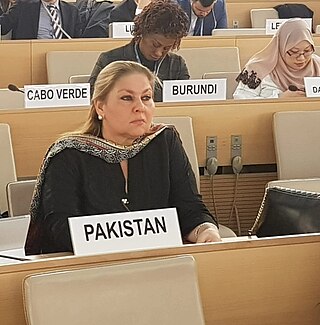Related Research Articles

Karachi is the capital city of the Pakistani province of Sindh. It is the largest city in Pakistan and 12th largest in the world, with a population of over 20 million. It is situated at the southern tip of the country along the Arabian Sea coast. It is the former capital of Pakistan. Ranked as a beta-global city, it is Pakistan's premier industrial and financial centre, with an estimated GDP of over $200 billion (PPP) as of 2021. Karachi is Pakistan's most cosmopolitan city, linguistically, ethnically, and religiously diverse cities, as well as one of the most socially liberal.

Hyderabad is a city and the capital of Hyderabad Division in the Sindh province of Pakistan. It is the second-largest city in Sindh, and the eighth largest in Pakistan.
The Muttahida Qaumi Movement (MQM), previously known as Muhajir Qaumi Movement, is a secular political party in Pakistan that was founded by Altaf Hussain in 1984. Currently the party is split between 2 main factions. MQM-London faction is controlled by Altaf Hussain from London, while MQM-Pakistan is run by Khalid Maqbool Siddiqui based in Pakistan. Its electoral symbol was a kite.
Pakistani clothing refers to the ethnic clothing that is typically worn by people in the country of Pakistan and by Pakistanis. Pakistani clothes express the culture of Pakistan, the demographics of Pakistan, and cultures from Punjab, Sindh, Balochistan, Khyber Pakhtunkhwa, Gilgit-Baltistan, and Kashmir regions of the country. The clothing in each region and culture of Pakistan reflect weather conditions, way of living, the textiles and embroidery used and its distinctive style which gives it a unique identity among all cultures.

Muhammad Naseem Rao is a veteran & well known Pakistani labour leader born in influential family of Sindh on 12 April 1962 at Nabisar Road Tehsil Kunri, District Umerkot Sindh
Factories in Pakistan's two largest cities of Karachi and Lahore caught fire on 11 September 2012. The fires occurred in a textile factory in the western part of Karachi and in a shoe factory in Lahore. The fires are considered to be the most deadly and worst industrial factory fires in Pakistan's history, killing 289 people and seriously injuring more than 600.

IndustriALL Global Union is a global union federation, founded in Copenhagen on 19 June 2012.
Sindhi clothing, Both Sindhi women and men wear the shalwar qameez or the kurta with pyjama. Women also wear sari or ghagra. However, before the adoption of the Shalwar kameez and the kurta, the sari as well as other articles of clothing, Sindhis had their own traditional costumes.

Rabiya Javeri Agha is the Chairperson of the National Commission for Human Rights (NCHR) in Pakistan, and a retired civil servant officer who served in the Government of Pakistan in BPS-22 grade as Federal Secretary. She was the first unanimously elected female President of the Pakistan Administrative Service (PAS) Officers Association, and she has had an extensive career ranging from human rights, women's development, sustainable tourism, energy, finance and trade.
Tufail Abbas was a Pakistani trade unionist and communist politician. He was a veteran labour leader in the airline industry, heading the Airways Employees Union. In later years he served as chairman of the Pakistan Mazdoor Mahaz and chief editor of the Urdu monthly Awami Manshoor.
Bangladesh Homeworkers Women Association, also known as BHWA, is an NGO, headquartered in Dhaka, Bangladesh. It is mostly known for working with the underprivileged homeworkers, also known as home-based workers by initiating social awareness programs, advocacy workshops, originating policy drafts, development and recommendation. BHWA focuses on key issues such as the elimination of child labour, female labourers' rights in the informal sector, occupational health and safety for women workers who are not covered by the Labour Code in Bangladesh.
Fariha Razak Haroon was a Pakistani politician and journalist who was a member of the Provincial Assembly of Sindh from 2002 to 2007. Born in 1956, she became the first Pakistani writer to be recognised by The International Federation of Journalists for this coveted feat. Her written article also earned her and Pakistan for the first time the prized European Commission's "Lorenzo Natali Prize for Journalism" in 2000. She became the first Pakistani writer to be recognised by The International Federation of Journalists.
The Aurat Azadi March was started in 2018 in Pakistan by members of Women Democratic Front, other organizations like Women's Action Forum, Elimination of Violence against Women and Girls alliance, Young Teachers Association, Home-Based Women Workers Union, Awami Workers Party, Awami Jamhoori Party also joined the march on International Women's Day in Islamabad. Aurat Azadi March and Aurat March are organized by different groups of women since 2018. Aurat Azadi March is organized by group of socialist feminists whereas Aurat March is organized by group of liberal feminists. Aurat March was also started the same year by the group of individual women known as "Hum Aurtein" collective in Karachi and Lahore.
The National Garment Workers Federation (NGWF) is a registered national trade union federation of garment workers in Bangladesh. With 87 registered factory unions, it ifs considered one of the four main federations of garment workers' unions. NGWF is the initiator and a member of the Bangladesh Garments Workers Unity Council and a member of the Bangladesh Center for Workers' Solidarity. It is affiliated with the IndustriALL Global Union and one of the signatories of the Bangladesh Accord.
The Bangladesh Independent Garment Workers Union Federation (BIGUF) is a trade union federation of garment workers in Bangladesh. It is considered one of the four main federations of garment workers' unions. BIGUF is affiliated with the IndustriALL Global Union and a member organisation of the Bangladesh Center for Workers Solidarity. It is also one of the signatories of the Bangladesh Accord. Unlike many other trade unions in Bangladesh, it is explicitly not affiliated with any political party.
Zehra Khan is a Pakistani trade unionist and activist. She is the general secretary of the Home-Based Women Worker's Federation (HBWWF). She is a member of many tripartite committees including the Sindh Minimum Wage Board, the Sindh Tripartite Labour Standing Committee, the Sindh Occupational and Health Council, and the Sindh HBWs Governing Body.

Diya Women Football Club, also referred to as Diya W.F.C., Diya WFC, Diya FC, Diya, Diya Women FC, or DWFC, is a Pakistani women's association football and futsal club based in Karachi. Diya means lamp in Urdu. It is the country's oldest women's football club, established in 2002. Diya W.F.C. has no affiliation to any men's club.
The Muttahida Labour Federation (MLF) is a national trade union centre in Pakistan, regarded as the country's second most important after the Pakistan Workers' Federation. The centre is primarily based in Sindh and the North-West Frontier Province.
Progressive Students Federation (PrSF) is a left-wing socialist students’ organisation based in Pakistan. PrSF was formed in 2014 in Khyber-Pakhtunkhwa but was later joined various factions of National Students Federation in Punjab and Sindh. The organisation has mobilised students and youth all over Pakistan for democratisation of campuses, restoration of student unions and universal education.
The crafts of Sindh and its craftsmen are held in high esteem and their works are notable not only in Sindh but also in many other places.
References
- ↑ "PROFILE: Fighting Forward: Home-based women workers organize in Pakistan". IndustriALL. 2019-11-13. Retrieved 2020-12-03.
- ↑ "International Women's Day: Women workers announce rally in Karachi". MM News TV. 2020-03-06. Retrieved 2020-12-03.
- ↑ Yaseen (2019-10-29). "Workers urged to get organized to end precarious work". National Trade Union Federation. Retrieved 2020-12-03.
- ↑ pakobserver. "home based federation".
- ↑ Clean Cloth Campaign, Home Net International "Affiliations". HBWWF. Retrieved 2021-03-13.
- ↑ "Sindh.Home Based Women Workers Federation Archives". Pakistan Press International. Retrieved 2020-12-03.
- ↑ "HBWWF demands practical implementation of Sindh Home-based Worker Act – Daily Balochistan Times" . Retrieved 2020-12-03.
- ↑ "Women that show the way. A conversation with Zehra Akbar Khan of the HBWWF, Pakistan". ∫connessioni (in Italian). Retrieved 2020-12-03.
- ↑ "Pakistan's International Women's Day march: Inclusive or exclusive?". South Asia@LSE. 2020-05-06. Retrieved 2020-12-03.
- ↑ "NTUF Pakistan: demos and rallies for the WDDW". www.ituc-csi.org. Retrieved 2020-12-03.
- ↑ "Speakers want labour rights for 5 million women workers in Sindh". AP-IRNet. Retrieved 2020-12-03.
- ↑ Aijaz, Chief Editor Nasir (2020-09-12). "Civil Society organizations stage demo in Karachi". Sindh Courier. Retrieved 2020-12-03.
{{cite web}}:|first=has generic name (help) - ↑ "Invisible no more: Sindh all set to adopt a policy for home-based workers". The Express Tribune. 2017-01-16. Retrieved 2020-12-03.
- ↑ APP (2020-04-28). "World Occupational Health and Safety Day observed". Brecorder. Retrieved 2020-12-03.
- ↑ "HBWWF, Sindh labour department sign MoU with HBWWF to register home-based workers". www.thenews.com.pk. Retrieved 2020-12-03.
- ↑ NTGent (2020-06-08). "School of Resistance: Distributing Dignity". NTGent. Retrieved 2020-12-03.
- ↑ "Unions hail Pakistan home worker protection law". www.just-style.com. 2018-05-31. Retrieved 2020-12-03.
- ↑ "Workers bodies demand implementation of labour laws in construction sector". The Biz Update. 2020-04-04. Retrieved 2020-12-03.
- ↑ "'Moving mountains': How Pakistan's 'invisible' women won workers' rights". the Guardian. 2020-12-01. Retrieved 2020-12-03.
- ↑ User2. "HBWWF completes 10 years: Rising poverty in Pakistan hits hard working class: Zehra Khan – Pakistan News Releases" . Retrieved 2020-12-03.
{{cite web}}:|last=has generic name (help) - ↑ Reporter, The Newspaper's Staff (2017-01-17). "New Sindh policy on home-based workers lauded". DAWN.COM. Retrieved 2020-12-03.
- ↑ "HBWWF Demands Practical Implementation Of Sindh Home-based Worker Act". UrduPoint. Retrieved 2020-12-03.
- ↑ "Sindh working on implementation of Home-based Workers Act | Pakistan Today". www.pakistantoday.com.pk. Retrieved 2020-12-03.
- ↑ "Call for early registration of home-based workers". The Nation. 2019-12-15. Retrieved 2020-12-03.